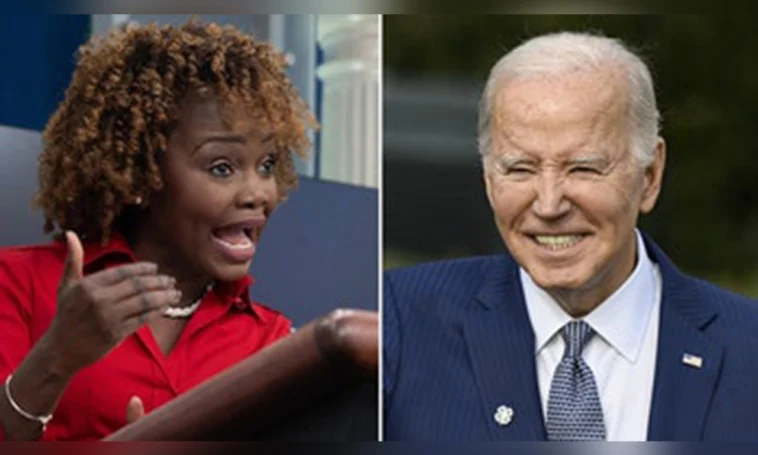Jean-Pierre rips NY Times’ report of Biden’s age, mental acuity.In the realm of contemporary American politics, the scrutiny surrounding President Biden’s age and mental acuity has become a focal point for media coverage and public discourse.
Against the backdrop of the release of the Hur report, which highlighted concerns about Biden’s memory, the White House press secretary, Karine Jean-Pierre, recently engaged in a heated exchange regarding The New York Times’ coverage of these issues. This episode underscores the complex interplay between journalism, politics, and the public’s perception of presidential fitness.
The Hur report, a significant document in its own right, brought to light observations regarding President Biden’s memory. Such revelations naturally trigger questions and debates about his ability to fulfill the demands of the highest office in the land effectively.
However, how these concerns are reported and framed by the media carries profound implications for public opinion and political dynamics.
Jean-Pierre’s criticism of The New York Times reflects a broader frustration within the Biden administration over what they perceive as undue emphasis on the president’s age and mental competence. The press secretary’s alignment with former Times public editor Margaret Sullivan’s critique underscores the depth of concern regarding media coverage of these sensitive topics.
In an interview this week with The Reuters Institute for the Study of Journalism, Sulzberger said, “We are going to continue to report fully and fairly, not just on Donald Trump but also on President Joe Biden. He is a historically unpopular incumbent and the oldest man to ever hold this office. We’ve reported on both of those realities extensively, and the White House has been extremely upset about it”
The Times’ series of reports examining Biden’s age and mental faculties, particularly in the aftermath of the Hur report, have provoked significant reactions from both political insiders and the general public.
Michael Shear’s characterization of Biden’s response to Hur’s description of his memory as a “political disaster” and the paper’s editorial critique of Biden’s attempts to reassure the American public highlight the contentious nature of the issue.
From the perspective of the White House, such coverage is perceived as unfair and unbalanced, potentially undermining Biden’s credibility and effectiveness as a leader. Jean-Pierre’s remarks during the press gaggle aboard Air Force One underscore the administration’s frustration with what they perceive as a disproportionate focus on Biden’s age and mental fitness, rather than his policy accomplishments and vision for the country.
In responding to questions about the boundaries of fair coverage, Jean-Pierre emphasized Biden’s achievements, framing the administration’s narrative around substantive legislative accomplishments.
By redirecting attention to policy outcomes, the press secretary sought to reframe the conversation away from age-related concerns and towards the administration’s broader agenda.
However, the issue of presidential age and mental acuity is not solely a matter of political optics; it has tangible implications for governance and decision-making.
In a hyper-partisan political environment where perceptions are often shaped by media narratives, the portrayal of Biden’s cognitive abilities can influence public trust and confidence in the executive branch.
At its core, the controversy surrounding Biden’s age and mental competence speaks to deeper anxieties about the nature of presidential leadership in an era defined by rapid demographic change and evolving societal norms.



Join the Community and Be a Part of the Conversation
You must be logged in or registered to post a comment.